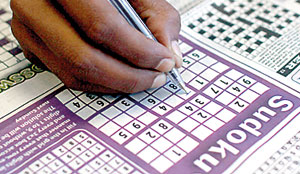Addiction, hobby or a preventive measure against Alzheimer’s disease, call it what you will, Sudoku is here to stay!
Whether you are at a doctor’s appointment and looking for something to while away the time or in search of something fun to do in the evenings, Sudoku is there to save the day and never too far away. Sudoku puzzles are found in newspapers, magazines, mobile phones, Sudoku puzzle books and on the internet! And what’s more, they are not at all costly either!
Sudoku today is not only a hit the world over, but has become quite a craze in Sri Lanka too!
Loved and played by people of different ages, Sudoku is not only a fun-filled means of entertainment, but is also instrumental in encouraging logical thought processes utilizing the short-term memory. Further, it also develops the ability to think critically and logically, while learning much patience!
15-year-old Sonali Perera (name changed) who recently started playing the puzzles that appear in the newspapers assures that “playing the game helps concentrate on your work as it requires logical reasoning.”
“I play it for fun,” says Nishadi Wickramage, 20. Nishadi’s interest in the game was sparked off when she was given a book of Sudoku puzzles by a friend a few years back. She now solves the puzzles that appear on the newspapers as well and says, “it is interesting and helps to while away the time.”
“When it was first introduced in Japan and then in the UK and USA, I thought why not introduce it in Sri Lanka too,” says M. R. M Azad who compiles Sudoku puzzles for many newspapers and magazines in Sri Lanka. “I created a programme on the computer so that the computer generates the puzzles,” he says adding, “the variations are such that it cannot get repeated.”
An ardent Sudoku fan himself, he seems to be surrounded by people who love the game as well. “My wife and two daughters love to play Sudoku,” he says, before adding with a laugh, “and so do some of my neighbours!”
Mr. Azad, in fact, compiled and published a book of Sudoku puzzles a few years back which not surprisingly sold out fast. The book included both easy and hard puzzles with the solutions at the back.
“Playing Sudoku helps activate the brain. It also sharpens the mind of students,” says Mr. Azad.
Considered a combination of mathematical and logical reasoning it is widely thought of as a good form of mental exercise for both young and old. Research has found that Sudoku helps prevent Alzheimer’s disease and is recommended highly for elders,” he said.
“Sudoku keeps you occupied and helps activate your brain,” says his wife, Basma Azad. “You get addicted to it. You have to get the hang of it by playing the game for some time and then you become hooked on to it,” enthuses this keen Sudoku fan.
To prevent getting stuck and frustrated, “you have to progress gradually and start with the easy ones,” advises Mr. Azad.
Sudoku, which seems a reliable tonic against boredom, further helps to develop the right brain since your creativity improves as you try to finish the challenge the fastest way possible.
its origins and rules
The Sudoku game which has managed to enslave many a person across the globe is believed to have its origins as far back as the 1780’s when the concept of ‘Latin Squares’ was introduced by Swiss Mathematician, Leonhard Euler. The Sudoku puzzles can also be traced back to the 19th century when various number puzzles were published in the French newspapers.
Though these puzzles differed in various aspects from the Sudoku puzzle played today, there are many similarities between those early puzzles and the modern Sudoku puzzle.
Then who developed the modern Sudoku?
General consensus credits Howard Garns, a retired architect and freelance puzzle constructor from Indiana, with the invention of the modern Sudoku. The puzzle when it was introduced in Japan was initially known as ‘Sūji wa dokushin ni kagiru.’ This is translated as ‘the digits must be single’ or ‘the digits are limited to a single occurrence.’ With time, the name was abbreviated to Sudoku.
Sudoku which went on to become an international hit by the years 2004/2005 is a logic-based, number-placement puzzle. The objective is to fill a 9×9 grid with digits so that each column, each row, and each of the nine 3×3 sub-grids that compose the grid contains all of the digits from 1 to 9. The puzzle setter provides a partially completed grid, which usually has a unique solution. |


